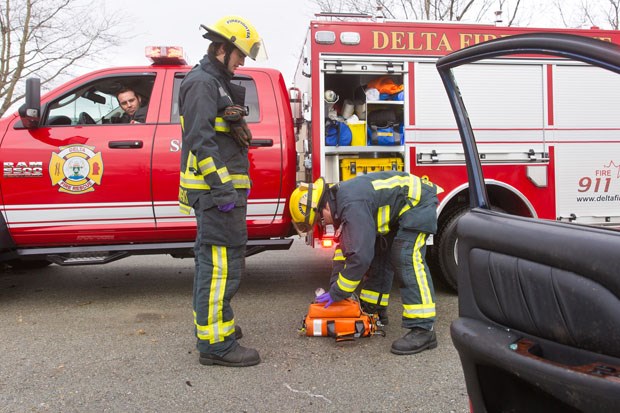B.C. Emergency Health Services says it’s concerned around misunderstandings when fire first responders are notified of medical emergency calls.
Following Delta council last week once again raising concerns about the revised Clinical Response Model that has seen Delta’s fire department notified of fewer emergency medical calls, and the civic politicians agreeing to go out to meet other city managers and councils for support on the issue, a spokesperson for BCEHS told the Optimist the issue is not well understood. When someone calls 911, they are asked whether they need fire, ambulance or police, and medical emergency calls are directed to BCEHS. Those calls go to one of three dispatch centres, where the calls are prioritized and assign resources to best match patient needs.
According to BCEHS, here’s the breakdown of when fire first responders are notified of medical emergency calls and their role, as mandated by the government under the Emergency Health Services Act.
When Fire First Responders are notified of a medical emergency:
• Fire First Responders are notified for all time-critical calls, where minutes and even seconds count.
• BCEHS also notifies fire departments of moderately-urgent calls, where an ambulance response is likely to take more than 10 minutes to arrive at scene.
• BCEHS also notifies fire departments of any calls that require their technical expertise and equipment. This includes all motor vehicle incidents and hazmat scenes, etc.
• BCEHS does not notify firefighters of every less-urgent call - if they are responding to a patient with a non-urgent condition, they could be tied up when we need them to respond to a life-threatening call.
• Each first responder partner agency (the vast majority are local fire departments) determines which types of medical emergencies they are able to respond to and when.
• In addition, if a response is delayed, BCEHS may request the assistance of local first responders to help care for the patient.
The role of First Responders and 911 medical emergency calls:
• Under the First Responder Program in BC, fire departments can provide basic first aid and emergency health services, such as CPR and defibrillation while paramedics are on route.
• The program is voluntary, with each local government decides the level to which their department will participate in the program. Some municipalities only wish to provide assistance to paramedics when required while others wish to provide more comprehensive first aid services for their communities.
• BCEHS partners with FR Agencies including fire departments, Search-and-Rescue groups, First Responder societies and First Nations communities through First Responder Agreements.
• Each First Responder agency determines the level of service that first responder agency can provide.



